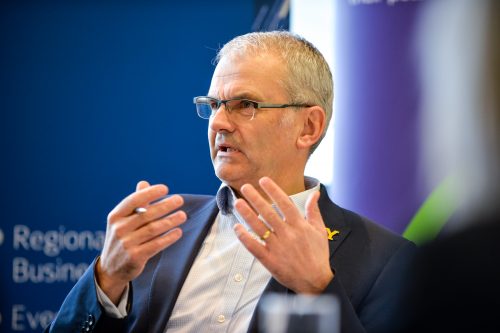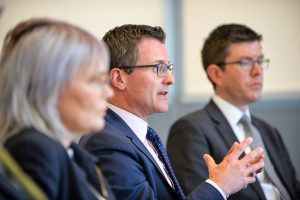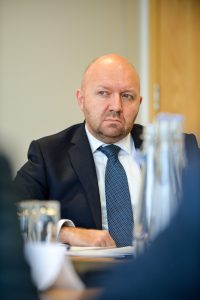Manufacturers striving for growth in the marketplace

How businesses plan for growth in uncertain trading times was a discussion point at TheBusinessDesk.com’s What Yorkshire Is Made Of roundtable.
Leaders from manufacturing firms Gripple, Dual Seal Glass, Daletech, Portakabin, William Cook and Wensleydale Creamery participated in the wide ranging discussion, which is being covered in a week-long What Yorkshire Is Made Of special report sponsored by Grant Thornton and Progeny Corporate Law.

Alistair Scott-Somers
Alistair Scott-Somers, of Progeny Law, said he would advise firms to look at the price expectation for sale and work back from that to plan a growth strategy – working in current revenue, perhaps initiating a ‘buy and build’ and planning on how to improve margins.
He added: “That’s sometimes a good way of dealing it, working out whether the focus needs to be on growth or business improvement. A lot of it is about getting a business ready for sale and the best model for a prospective buyer. Think ‘what do they need to see’?”
Tracey Dawson, MD of Daletech, said the firm saw a 60% growth in the last year. She said: “We manufacture low volume, high quality electronic products. As long as the products have electronics in, that’s where our expertise lie.
“I am really lucky, my customer base 15 miles from Leeds – so we have a long way to go. Our growth has been around offering niche, high quality and low volume. OEMs are looking for our services.”
She said the firm was targeting 100% growth this year and to become the UK’s electronic experts. She added: “But I can also see that we would be a useful bolt-on to high volume manufacturers. So we also have to think about being ready for sale, if we want to take that option.”
Dawson added that growth would also come about by being a great employer. “I believe, with the greatest respect, anybody can manufacture – you just need the right skillset. It’s about being more than that.”
Gordon Macrae of Gripple agreed, stating: “One of the things that underpinned our success is focus on people. One of the key drivers, which is fundamental to any business, is our focus on people. That will see us

Gordon Macrae
through some challenging individual circumstances. We are going to have grown by at least 10% in 2019.”
Gripple is employee owned so he said the firm had a different take on it, in that the business can never be sold. He said: “Our focus is on creating value for a customer, not on delivering profits per se. The focus is on actually creating great products, motivating people to manufacture and a structure; if you get that right, the profits flow.”
Macrae said: “We don’t budget for a full year, we actually only budget for six months because we think the world is such an uncertain place. Enshrined in our constitution is the fact that we have to grow by at least 10% and we are comfortable we will do that.”
“We have got some really exciting things coming through this year and one of my projects is putting up a new factory for an automation business that we have created and we are about to spin-out. Again, it’s about finding solutions to problems that aren’t being solved in the UK.”
David Hartley, managing director of Wensleydale Creamery, said his growth plans had a “two-pronged approach” – both looking at the marketplace and also focusing on cost control, procurement and factory efficiency.
He said that exporting to the US and Far East was a good growth strategy and that the firm secured its first order to Australia this month. In the UK, the food service sector is a growth opportunity as it is a marketplace is doesn’t already get too involved in. “And in supermarkets, we have started to supply ‘discounters’. They have a different business model,” he said.

Simon Pollard
Hartley warned that whatever growth the business planned, it had to be done carefully because of commitments to the farmers. “Whether we sell cheese or not, we still have to buy that milk,” he said.
“If you have a downturn in cheese demand, we are still committed to buy that milk. We have to plan a growth strategy around how we get milk and where we get it from. If we want to take on more farmers, it might take 12 months for them to join because they will need to leave their existing committed contract. It is a real long-term step-step-step approach.”
Simon Pollard of York-headquartered Portakabin said that the business had a mature and large part of the market in the UK but it was still planning to grow in Europe, where it is a small player in big market. He added: “With modular buildings, we would be looking to target a different market in Europe.
“But for growth potential, we will first iron our creases here. Innovation will step us into the unknown, into robotics. You can put that anywhere and that negates the possibility of a skills shortage. A lot of decisions for this are around supply chain and it’s good for us to have a foot either side of the channel.”
TheBusinessDesk.com’s What Yorkshire Is Made Of coverage, sponsored by Grant Thornton and Progeny Corporate Law, will be published every day this week and content available on the dedicated Special Report page.









